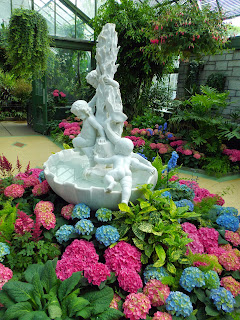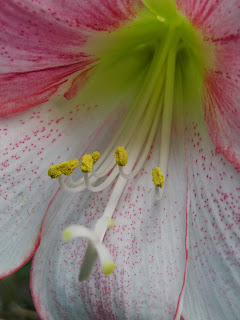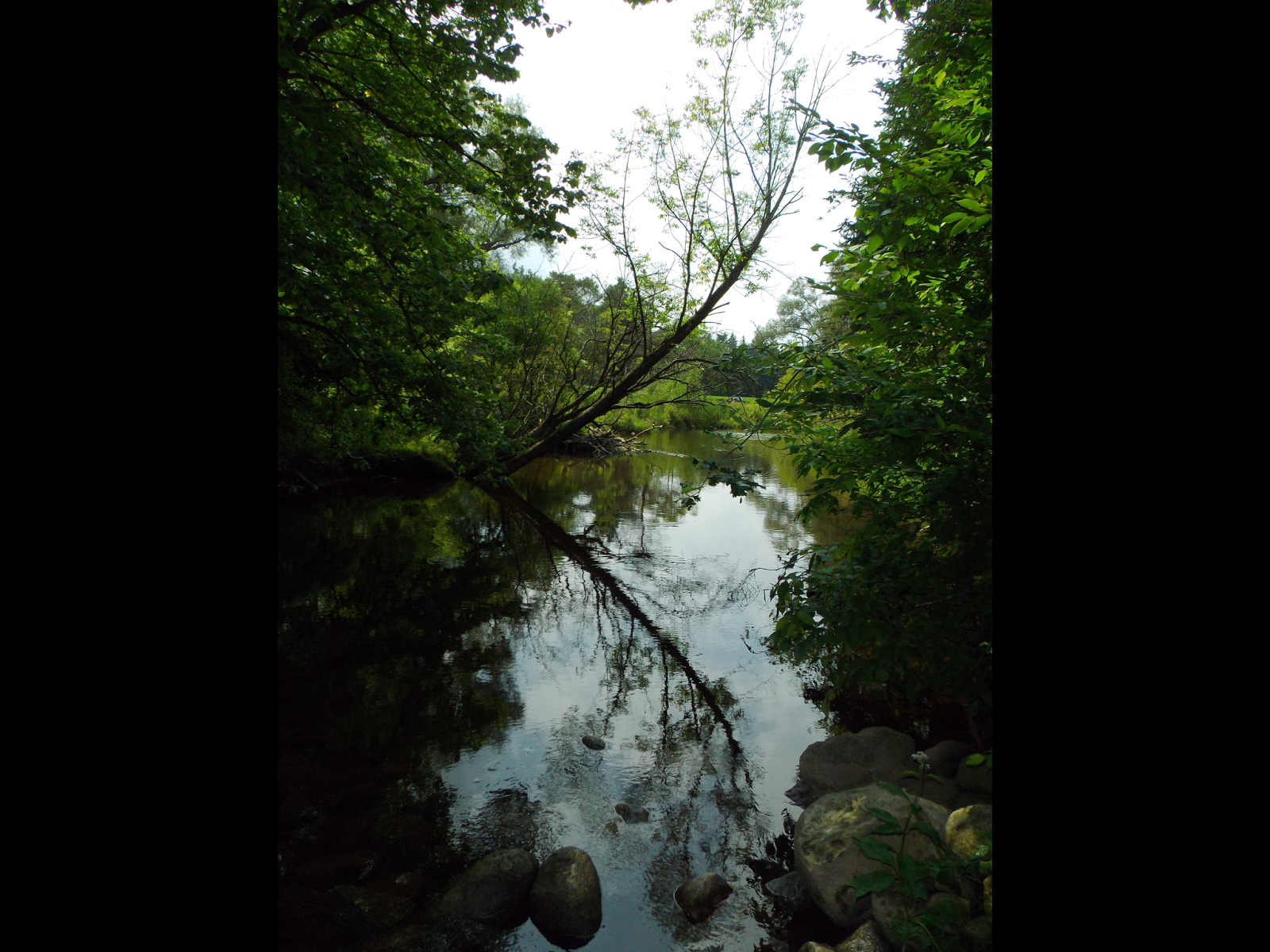Today, we went and visited BAPS Shri Swaminarayan Mandir. The Mandir is Canada's first traditional Hindu place of worship. It is built in Vedic tradition which dates back many millenia. More than 95,000 cu. ft. of hand-carved marble, limestone and sandstone have been assembled without steel in the foundation or structure. Stone structures built in such tradition are known to last for hundreds of years.
24000 pieces of stone were hand carved in India by 400 volunteers for a total of 1000000 hours. All of these pieces were shipped to Toronto and reassembled to form the existing building. It is an amazing place of worship to visit. The hand carvings are incredible to see. The temple is located just off Finch Ave. in Toronto and is free to visit. A museum inside is also worth a visit. It tells of advancements in the sciences and mathematics of India that most people would not be aware of.
Teak from Burma is used in some areas as decorative carvings. A sense of peace and tranquility seems to be within the temple walls. It is worth the trip to experience a touch of what Hinduism is all about.
Unique Ontario Destinations
A blog about unique and unusual places that I have visited.
Sunday, June 21, 2015
Monday, June 8, 2015
St. Thomas
Last summer, we visited St. Thomas. It is known for having Ontario's longest small town train station. It is 12 metres wide and 120 metres long. It was constructed in 1873 when a railway line known as the Canada Southern Railway (CSR), in reality, an American owned shortcut between Buffalo and Michigan, selected St. Thomas as a major divisional yard and repair facility.
In 1885, one of North America's most notable train accidents occured, when the Barnum & Bailey circus elephant Jumbo was killed by a freight train. A statue in town recalls the accident.
The train station has now become North America Railway Hall of Fame. Nearby the repair building has now become the Elgin County Railway Museum.
Also in the city are several murals painted on the sides of buildings. A lot of the murals deal with trains as the subject matter.
Wheher a train enthusiast or not, it is worth a visit to the town. It is a small picturesque place to visit.
In 1885, one of North America's most notable train accidents occured, when the Barnum & Bailey circus elephant Jumbo was killed by a freight train. A statue in town recalls the accident.
The train station has now become North America Railway Hall of Fame. Nearby the repair building has now become the Elgin County Railway Museum.
Also in the city are several murals painted on the sides of buildings. A lot of the murals deal with trains as the subject matter.
Wheher a train enthusiast or not, it is worth a visit to the town. It is a small picturesque place to visit.
Sunday, May 10, 2015
Niagara Falls Greenhouse And Betty's Restaurant
Today was Mother's Day and so I wanted to show my wife some fun things. We drove to Niagara Falls along the Niagara Parkway and went to visit one of the lesser known sites, the Niagara Greenhouse or more commonly known as the Floral Showhouse. If you have never visited here, it is definitely worth a visit. Four times a year, they change their main display to reflect flowers that are in bloom at the time. Today's main flowers were hydrangeas. Also at the greenhouse, one room contains plants that are there year round.
After visiting the greenhouse, we went further along the parkway into the town of Chippawa to one of our favourite spots, Betty's Restaurant. It is famous for its fish and chips or prime rib dinner. When there, try their pie for dessert which tastes home made. Check out the photos below and if you are ever in Niagara Falls, be sure to drop by one or both of these spots. I'm sure you won't be disappointed.
Saturday, May 2, 2015
Stoneboats Restaurant in Bronte
Stoneboats has been renamed to Yolanda's Spuntino Casa which roughly translates to Yolanda's House of Appetizers and Snacks. What makes this building interesting is what its walls are made from.
In the 1840's, boats called stone-hooker boats, or stoneboats, using grappling hooks, lifted rocks and boulders, in particular well rounded and often flat shale from the shores of Lake Ontario from Whitby to Port Credit.
The stone loads, known as toises, were loaded onto schooners and shipped to Toronto, where they were sorted by size according to usage. Smaller stones would be used for road ballast, flat stones for pavement, and large round stones would end up in building foundations. This is where the material came from to build Stoneboats.
By the 1850's, more than 30 stone boats were in use, but farmers started to complain that the practice was eroding their farmlands, and in 1857, laws were enacted that boats could not work any closer than 30 metres from the shore.
This, and the fact that concrete replaced stones in construction, the stone boats stopped scooping up the rocks from the lake bed. Not many of the original buildings exist. Stoneboats or should I say, Yolanda's is one of the few remaining. It was constructed from theses stones by a one-time stone boat captain, hence the name.
It is located at 49 bronte Road in the picturesque village of Bronte which is now part of Oakville. It is designated a Heritage site and is worth a visit for a meal, a beer or whatever.
In the 1840's, boats called stone-hooker boats, or stoneboats, using grappling hooks, lifted rocks and boulders, in particular well rounded and often flat shale from the shores of Lake Ontario from Whitby to Port Credit.
The stone loads, known as toises, were loaded onto schooners and shipped to Toronto, where they were sorted by size according to usage. Smaller stones would be used for road ballast, flat stones for pavement, and large round stones would end up in building foundations. This is where the material came from to build Stoneboats.
By the 1850's, more than 30 stone boats were in use, but farmers started to complain that the practice was eroding their farmlands, and in 1857, laws were enacted that boats could not work any closer than 30 metres from the shore.
This, and the fact that concrete replaced stones in construction, the stone boats stopped scooping up the rocks from the lake bed. Not many of the original buildings exist. Stoneboats or should I say, Yolanda's is one of the few remaining. It was constructed from theses stones by a one-time stone boat captain, hence the name.
It is located at 49 bronte Road in the picturesque village of Bronte which is now part of Oakville. It is designated a Heritage site and is worth a visit for a meal, a beer or whatever.
Saturday, January 3, 2015
Belfountain Conservation Area
Last summer, we visited one of Ontario's most unusual parks known as the Belfountain Conservation Area. It was the creation of Charles W. Mack who is known as the industrialist who invented and then manufactured the cushion stamp.
When finished, the park contained a dam for swimming, a lookout point and a cave named Yellowstone that was converted into a chapel-like room and a suspension bridge across the river. The most noteworthy feature is a stone fountain with a bell on top, commemorating the name of the neighbouring village, Belfountain.
In 1955, the Credit Valley Conservation Authority purchased the property and varous hiking trails were added. The park lies in the village of Belfountain on the Forks of the Credit Road.
When finished, the park contained a dam for swimming, a lookout point and a cave named Yellowstone that was converted into a chapel-like room and a suspension bridge across the river. The most noteworthy feature is a stone fountain with a bell on top, commemorating the name of the neighbouring village, Belfountain.
In 1955, the Credit Valley Conservation Authority purchased the property and varous hiking trails were added. The park lies in the village of Belfountain on the Forks of the Credit Road.
Monday, November 3, 2014
Ireland House at Oakridge Farm
Yesterday, we visited Ireland House in Burlington. It was built between 1835-1837 and was the home of Joseph Ireland, an English Immigrant and one of Burlington's earliest settlers. It was lived in by Ireland family descendants until 1987, when it was purchased by the city of Burlington to become its second museum.
The house is decorated in three eras of the Ireland occupancy, 1850's, 1890's and 1920's, each representing a time period one of the Ireland family resided there. It is well-preserved with all original possessions of the Irelands. It is located at 2168 Guelph Line in Burlington and is an important part of Burlington's history. It is well worth the trip and when there,make sure you take a tour by one of the knowledgeable guides.
The house is decorated in three eras of the Ireland occupancy, 1850's, 1890's and 1920's, each representing a time period one of the Ireland family resided there. It is well-preserved with all original possessions of the Irelands. It is located at 2168 Guelph Line in Burlington and is an important part of Burlington's history. It is well worth the trip and when there,make sure you take a tour by one of the knowledgeable guides.
Monday, October 13, 2014
Lowville Park
Located in north Burlington along Guelph Line is the small village of Lowville, and one of its highlights is Lowville Park. It is located on Bronte Creek and contains several acres with picnic areas, trails for hiking or snow shoeing in the winter, an area for tobogganning in the winter and play areas for children.
It is a relaxing area to come and just unwind for a couple of hours. Make sure you visit the ice cream store across from the park behind the Bistro.
Also of note in the park is a school house that was built in 1888. It has been designated as a Heritage Building that is now used for meetings and Boy Scout activities. Unfortunately, it is not open to the general public. In 1947, a parks maintenance building was added and also functions as a workshop.
It is a relaxing area to come and just unwind for a couple of hours. Make sure you visit the ice cream store across from the park behind the Bistro.
Also of note in the park is a school house that was built in 1888. It has been designated as a Heritage Building that is now used for meetings and Boy Scout activities. Unfortunately, it is not open to the general public. In 1947, a parks maintenance building was added and also functions as a workshop.
Subscribe to:
Comments (Atom)

























